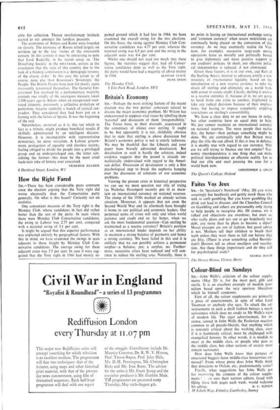Britain's Economy
SIR,—Perhaps the most striking feature of the recent election was the two parties' consistent refusal to discuss the major economic problem. Mr Wilson has endeavoured to suppress vital issues by labelling them 'national' and discussion of them 'irresponsibility.' The Tories have, to their discredit, acquiesced in the conspiracy of silence over sterling. It ought to be, but apparently it is not, childishly obvious that to state that sterling is above discussion but Britain's economic policy is not is utterly ludicrous. We may be thankful that the Liberals and your paper have bravely advocated devaluation. But devaluation as such is hardly the solution, indeed evidence suggests that the pound is already un- realistically undervalued with regard to the Ameri- can dollar. Discussion of devaluation is only a first psychological step to break the euphoria hanging over the discussion of solutions of our economic problems.
Viewing the present crisis in historical perspective we can see we must question our role of trying (as Nicholas Davenport recently put it) to main- tain an international currency on national reserves. The slump of the 1930s masked an already serious situation. Moreover, it appears that not even the Second World War and its aftermath have brought it home to our political and economic leaders. Our perpetual series of crises will only end when world patience and credit end or, far better, when we ask the most fundamental question—Can sterling be maintained as a reserve currency? Britain's position as an international lender depends on her ability to maintain a strong balance of payments and hence a strong currency. We have failed in this and it is unlikely that we can possibly achieve a permanent surplus—a balance, yes; a surplus, no. Further- more, successive crises have reduced and will con- tinue to reduce the sterling area. Naturally, there is no point in having an international exchange centre and 'common currency' when severe restrictions are continually being placed on the conversion of this currency. As we may eventually realise (in Viet- nam, for example), successive large-scale rescue operations leave us morally and politically bound to give diplomatic and more positive support to our creditors' policies. In short, our effective politi- cal independence is reduced, if not eliminated.
Given these factors, it is in our own, and Rest of the Sterling Area's, interest to advocate jointly a new structure of international liquidity based on the introduction of a new reserve currency to take the strain off sterling and ultimately on a world bank with power to create credit. Clearly, sterling is useless as a reserve currency if, because of it, we are going to lurch from one crisis to another, frightened to take any radical decisions because of their implica- tions, but having to impose completely crippling restrictions on sterling's convertibility.
We have a clear duty to set our house in order, but other countries have an equal duty to help. We just cannot maintain an international currency on national reserves. The more people that realise this, the better—then perhaps something might be done. We are continually told that Britain must play the role she can afford. If this is true in defence, it is doubly true with regard to our currency. Why are we still trying to finance our lost empire? Eco- nomic interdependence is one thing that can make political interdependence an effective reality. Let us find our role and start pressing the case for a world bank now.
CHRISTOPHER J. GREEN
The Queen's College, Oxford


































 Previous page
Previous page